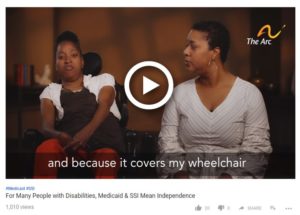#HandsOff: Advocating With Young Children
This was part of a series called #HandsOff, where we featured calls to action and stories from families across The Arc’s network about how key policy issues impact their day-to-day lives.
Written by: Julie Ross, Member of The Arc of Texas and Mother to a Daughter with Down Syndrome
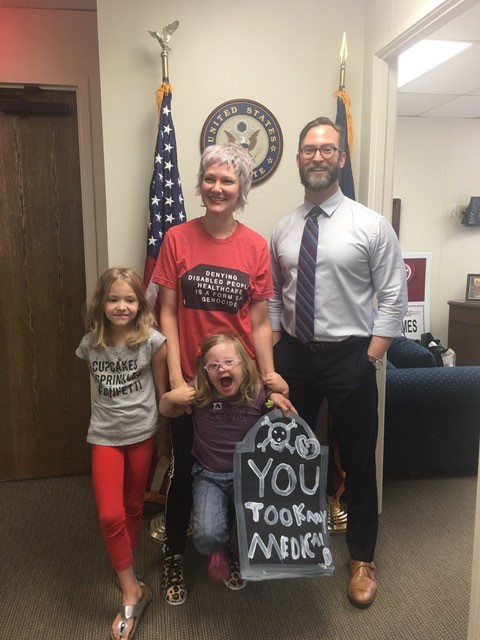
My almost seven-year-old daughter Niko is fun and full of energy, loves dancing, singing, and doing daredevil stunts. Niko adores her big sister, playing with her homeschool friends and caring for younger children. In addition to keeping up with her, my job has also been to advocate for her healthcare, inclusion, and civil rights – and it began the day she was born. Niko has Down syndrome and congenital heart disease. While she was still recovering in the NICU, a social worker explained to us about Medicaid and “waitlists”. The social worker said to apply for state and federal healthcare services immediately, even though some of these were adult services, because the wait was 14 years and growing. Afterwards, I joined my state chapter of The Arc and The Arc of the United States and learned that we could impact these issues—and more. We have high expectations for Niko, so if we could eliminate barriers that prevent her from reaching her potential, we were willing to demand change. From the start, we knew Niko would be at the center of these advocacy efforts.
Policies at both the state and federal level greatly impact Niko’s access to services and healthcare she needs to live a full, happy life. And it often feels as if the impact of legislation on the disability community isn’t being considered by elected officials. In order to become a better advocate, I joined state and national disability advocacy organizations and attended rallies led by self-advocates. Niko and I made a host of new friends and I was mentored by other families. I drove with both of my daughters to our state capitol to meet with our elected officials to advocate for Medicaid and Early Childhood Intervention funding.
We took advice from The Arc and contacted our federal lawmakers. Niko and I made office visits to Senator Ted Cruz and Senator John Cornyn’s district offices. We talked about the importance of phasing out subminimum wage, fully funding Medicaid, saving the Affordable Care Act, and supporting legislation such as Money Follows the Person to ensure Niko could live free from the threat of institutionalization. At these meetings, I would carry a stash of snacks and coloring books to entertain Niko while I did most of the talking (although she would vocalize occasionally and toss cookie crumbs on the floor). Whenever I felt fear or intimidation of how lawmakers and staff may react to my child attending our meeting, I would remind myself that my taxpayer dollars pay for their offices and these lawmakers work for us! Most of all, I want lawmakers to know my daughter’s name, face, and story to remind them of what is at stake when they vote. And to make that connection, it is important for them to meet Niko in person.
We always try to make a lasting impression. Once we even celebrated Niko’s birthday in our Senator’s offices. I brought balloons, cupcakes, and birthday cards for their staff to sign and share with the Senators – urging them to protect Medicaid and ACA to preserve Niko’s healthcare protections so she could celebrate many more birthdays. And last Valentine’s Day, we asked our Congressman to “have a heart” and oppose a dangerous bill that would have weakened the protections afforded by the Americans with Disabilities Act.
We’ve seen the positive changes that result from state and national disability advocacy. When we exercise our constituent power and families, individuals, and self-advocates deliver our “ask” and our personal stories – we make a tremendous impact. And while Niko still acquires new interests and hobbies as she grows up, I’m delighted that she and I can include advocacy as an integral part of our family life.
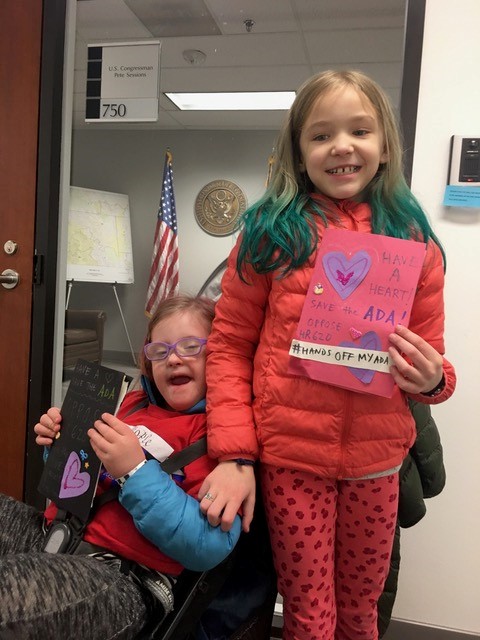
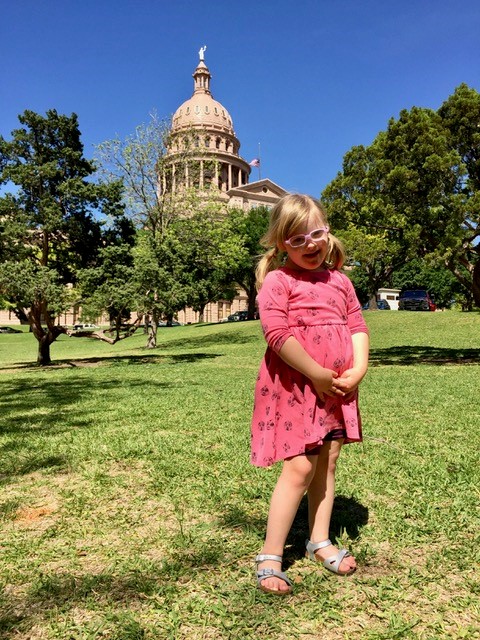


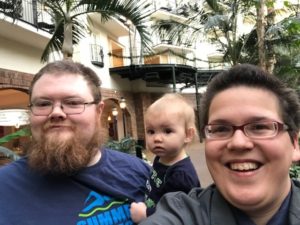 On November 7th, I got to go to Tennessee for the first time for The Arc’s National Convention! It was a blast. When I found I won the scholarship, my husband and I saved up so he and my daughter got to come with me and see the sights.
On November 7th, I got to go to Tennessee for the first time for The Arc’s National Convention! It was a blast. When I found I won the scholarship, my husband and I saved up so he and my daughter got to come with me and see the sights. My sister, Rebecca, is sixty years old and one of the most amazing and resilient women I have ever met. When she was born in 1958, autism was barely whispered among doctors. The general public knew nothing about the condition. Becky wasn’t officially diagnosed with autism until she was thirty-seven years old.
My sister, Rebecca, is sixty years old and one of the most amazing and resilient women I have ever met. When she was born in 1958, autism was barely whispered among doctors. The general public knew nothing about the condition. Becky wasn’t officially diagnosed with autism until she was thirty-seven years old. During August Recess, Members of Congress return to their home states to meet with their constituents. It’s the perfect time for advocates to meet with legislators and tell them #HandsOff important programs – like
During August Recess, Members of Congress return to their home states to meet with their constituents. It’s the perfect time for advocates to meet with legislators and tell them #HandsOff important programs – like  Meet Samera! Samera is 27 years old, a poet, and likes to read books, go to concerts, and spend time with her friends and family. She lives in a home in her community, supported by The Arc of Baltimore.
Meet Samera! Samera is 27 years old, a poet, and likes to read books, go to concerts, and spend time with her friends and family. She lives in a home in her community, supported by The Arc of Baltimore.